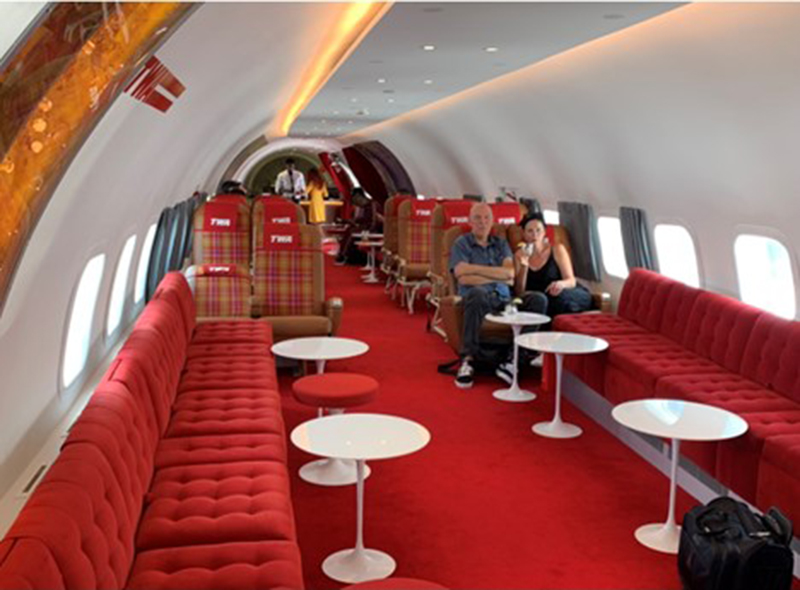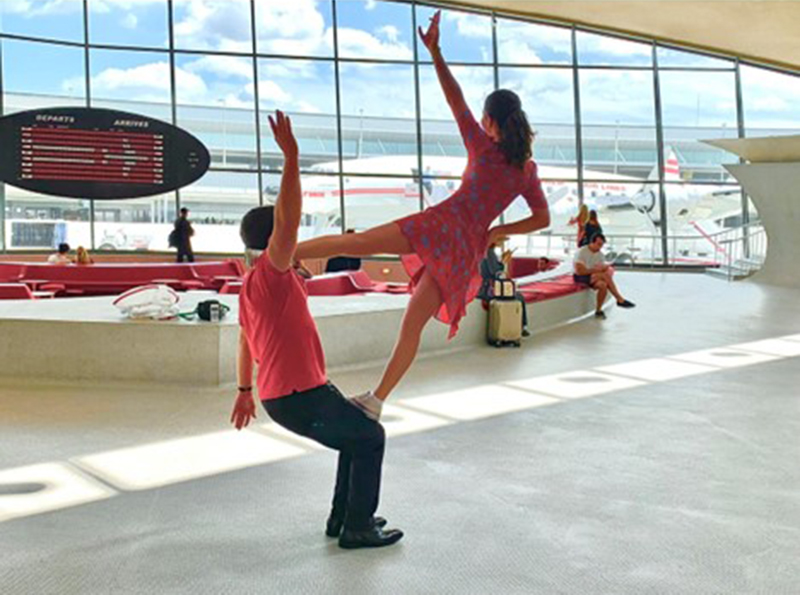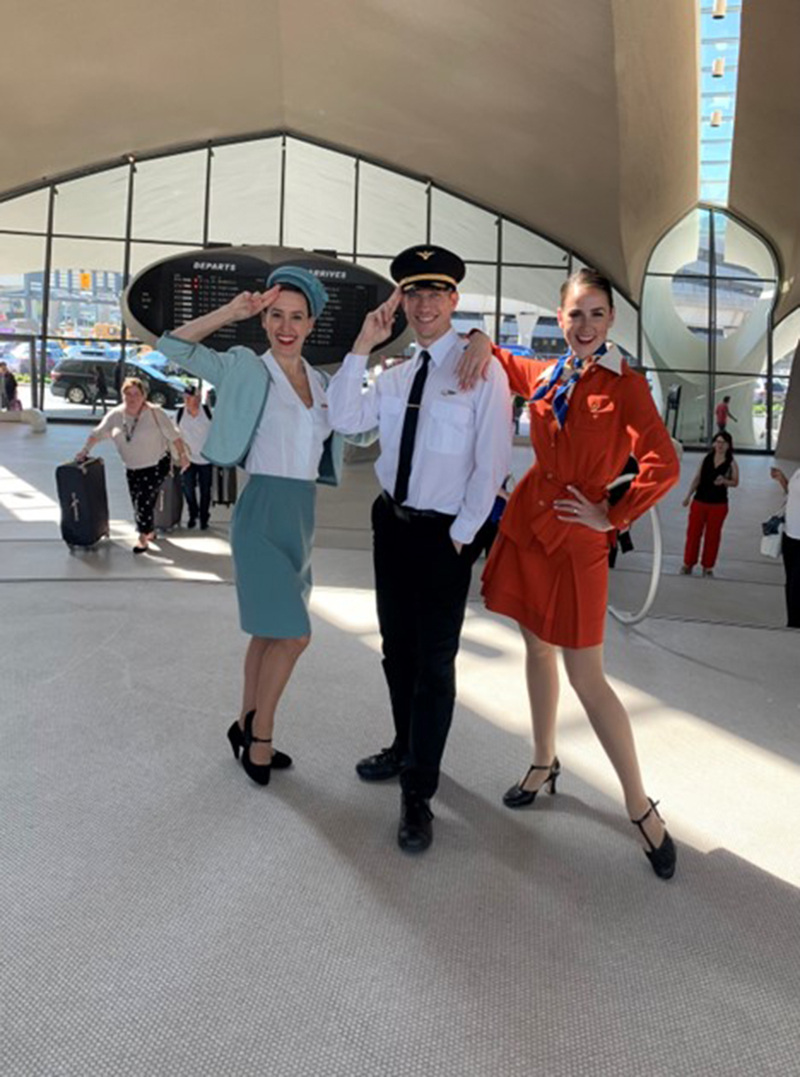

Over the past two years, New York City’s hotels have been trading at a huge discount. Hotel owner/operator MCR, which has a reputation for redeeming troubled properties, won applause just prior to the onset of the pandemic by turning a 1895 red brick Collegiate Gothic jewel (originally built as student housing for General Theological Seminary) into The High Line Hotel, a 60-room property on 10th Ave. at 20th St. in Chelsea.


 MCR also built a 512-room hotel adjacent to the TWA Terminal at John F. Kennedy International Airport (which was commissioned by Howard Hughes, designed by Eero Saarinen, and opened in 1962). The property features a roller-skating rink on the tarmac, and, in its rear yard facing the runways, a restored Connie TWA propellered airplane that serves as a cocktail lounge for its guests. The terminal itself has been totally restored and turned into a viewing area where guests can watch planes take off. A restaurant run by Jean Georges tops off the features, and MCR employees dressed as flight crews greet the guests.
MCR also built a 512-room hotel adjacent to the TWA Terminal at John F. Kennedy International Airport (which was commissioned by Howard Hughes, designed by Eero Saarinen, and opened in 1962). The property features a roller-skating rink on the tarmac, and, in its rear yard facing the runways, a restored Connie TWA propellered airplane that serves as a cocktail lounge for its guests. The terminal itself has been totally restored and turned into a viewing area where guests can watch planes take off. A restaurant run by Jean Georges tops off the features, and MCR employees dressed as flight crews greet the guests.
MCR also made a big bet on a true grande dame of Manhattan: The New Yorker Hotel on Eighth Ave., which offers 1,050 rooms convenient to Herald Sq., Madison Square Garden, and the Jacob Javits Convention Center.
At the beginning of the pandemic, MCR seized another huge opportunity, buying the 168-room Royalton Hotel for $42 million, which comes to $250,000 per key. In March of this year, MCR announced the purchase of the 1,780-room Times Square Sheraton Hotel (on Seventh Ave. between West 52nd and 53rd Sts.) for $373 million, or $209,000 a key. The previous owner, Host Hotels, had bought it for $738 million in 2006. That’s a $365 million discount, even without factoring in the loss of the property’s appreciation. MCR also bought the 725-room Lexington Hotel (on Lexington Ave. at 48th St.) for $183.5 million: $253,000 a key.
The Mandarin Oriental at Columbus Circle—a 5-star luxury hotel with views of Central Park, adjacent to The Time Warner Center, was valued at $363 million prior to the pandemic. The property sold last year for $98 million or $395,000 a key—a discount of $265 million—with an India-based conglomerate, Reliance Industries, taking a majority stake.
A few major “theme” hotels have recently come on the market too. Right before the pandemic, Jimmy Buffet’s company, Margaritaville Resorts, collaborated with Soho Properties and Norman Sturner of Murray Hill Properties on a ground-up project at Seventh Ave. at 40th St.: a 170,000 s/f, 32-story structure with 234 keys. It’s going to have all the bells and whistles that Buffet’s other hotels feature, and plenty of margaritas for its guests. (At Jimmy’s place, Happy Hour runs from 11:00 a.m. to 6:00 p.m., Monday through Friday.)
The Hard Rock Hotel just opened at 159 West 48th St., between Sixth and Seventh Aves. It features 446 rooms, and nightly rates will start at $475. This looks to me like a big gamble, but one good omen is that this is the block where Jimmy Hendrix used to buy his guitars (at Manny’s or Sam Ash Music Center).
I have to give credit to these investors, and I hope their gambles pay off. It will be good for everyone if they do. The pandemic turned almost everybody’s world upside down, and the hotel industry, specifically, has not yet righted itself. It may not, for a long time. The “golden era” of travel is long gone—or at least on an indefinite pause. For years, I was a globetrotter and delighted to be one: marrying a gal from Northern Ireland; traveling all over with her; attending luxury retail summits at various exotic destinations; meeting with the world’s Who’s Who. (You can visit my travel blog at www.JAACRES.com/travelblog/, to see some of the places I’ve gone for business and pleasure, with comments to boot.)
At its zenith as a tourism and business travel destination, New York City brought in 65 million visitors in a year. I don’t dare predict a number for 2022. (How could I? Like most market observers, my crystal ball is in the shop for an overhaul.) But it’s not going to be 65 million. We can only hope for the best. It took five years after 9/11 for the average daily room rate and hotel occupancy levels to come back to normal in New York City. Hoteliers today are only hoping that that’s how long it will take, post-pandemic. However, the psychological effects of COVID are still being felt all over the world, and it may take much longer for people’s former travel habits to return. Zoom and other teleconferencing capabilities now are persuading people to stay put, now that people are used to using them, and many people are still uneasy about traveling for pleasure. The various indignities still in play at airports and in airplanes aren’t helping. New York City’s hotel industry will face considerable challenges, as it attempts to get going again at a reasonable speed after having slowed to a near standstill.
JAACRES is a full service commercial real estate firm specializing in the leasing of retail, restaurants, office, and industrial space. We also specialize in the sale of hotels.
Joseph Aquino is president of JAACRES, New York, N.Y.




